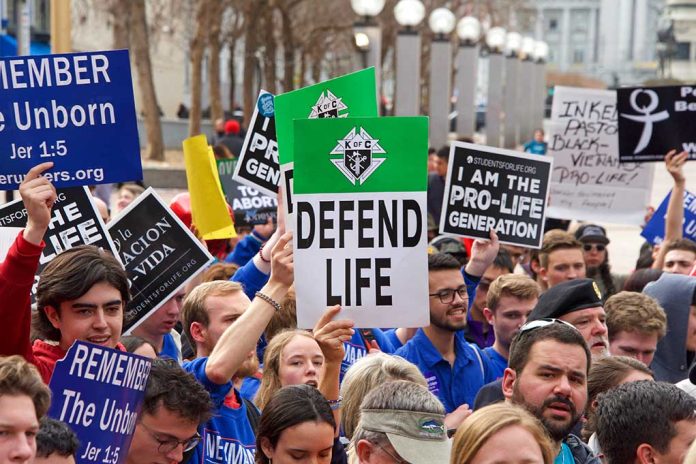
Pro-life activists convicted under the Biden administration may receive pardons from President-elect Donald Trump, sparking a heated debate over reproductive rights and legal activism.
At a Glance
- Thomas More Society attorneys request pardons for 21 pro-life advocates prosecuted by Biden’s DOJ
- Activists were convicted under the FACE Act and “Conspiracy Against Rights” statute
- Trump has indicated willingness to review and potentially pardon these cases
- Debate centers on alleged misuse of FACE Act and government overreach
- Pardon request highlights perceived disparity in prosecution of pro-life vs. pro-choice activists
Pardon Request for Pro-Life Activists
The Thomas More Society, a conservative legal organization, has formally requested that President-elect Donald Trump pardon 21 pro-life advocates who were prosecuted and convicted during the Biden administration. These individuals, ranging from grandparents to pastors and even including a Holocaust survivor, faced charges under the Freedom of Access to Clinic Entrances (FACE) Act and the “Conspiracy Against Rights” statute for their actions at abortion clinics.
The pardon request package, submitted by the Thomas More Society, includes individual requests for each advocate, detailing their cases and character. Steve Crampton, Senior Counsel for the organization, emphasized the urgency of the situation, stating, “With these requests for presidential pardons for 21 peaceful pro-life advocates, we urge President Trump to right the grievous wrongs of the Biden administration’s weaponization of the Department of Justice.”
Imprisoned pro-life activist Jonathan Darnel hopes for Trump pardon after prosecution by Biden DOJhttps://t.co/CocHojaHiL pic.twitter.com/oroL8jvuY7
— The Washington Times (@WashTimes) December 25, 2024
Controversial Enforcement of the FACE Act
The FACE Act, which penalizes obstructing access to abortion clinics, has been at the center of controversy. Critics argue that the Biden administration has selectively enforced this law, targeting pro-life demonstrators while largely ignoring attacks on pro-life pregnancy centers and churches. According to reports, the Department of Justice under Biden charged over 30 pro-life demonstrators under the FACE Act but pursued only two cases involving pro-life pregnancy centers. This perceived disparity in enforcement has fueled accusations of viewpoint discrimination, with some arguing that it violates the First Amendment.
“These peaceful pro-life Americans mistreated by [President Joe] Biden include grandparents, pastors, a Holocaust survivor, and a Catholic priest — all are selfless, sincere patriots,” wrote Crampton in a statement.
Trump’s Potential Response
President-elect Trump has previously indicated his intent to review and potentially pardon pro-life advocates prosecuted during the Biden administration. This stance aligns with his campaign promises and criticism of the Biden administration’s approach to the pro-life movement. Peter Breen, Executive Vice President of the Thomas More Society, sees this as an opportunity for Trump to address what they perceive as governmental overreach.
“By acting on the requested presidential pardons, President Trump has a golden opportunity to not only stop the lawfare against peaceful pro-lifers, but to also undo some of the unprecedented damage of the Biden administration,” said Breen.
The request for pardons comes in the wake of Biden’s own clemency actions, which included commuting sentences for 37 federal death row inmates and 1,500 others, as well as issuing 40 pardons, including one for his son, Hunter Biden. Notably, none of the pro-life activists were among those pardoned by Biden.
Implications and Debate
This situation has reignited the national debate over reproductive rights and the limits of legal activism. Supporters of the pardon request argue that these activists were engaged in 1st amendment protected peaceful civil disobedience. Critics, however, maintain that these actions crossed legal boundaries and interfered with access to healthcare services. The outcome of this pardon request could have significant implications for future enforcement of the FACE Act and the broader landscape of reproductive rights activism in the United States.






















